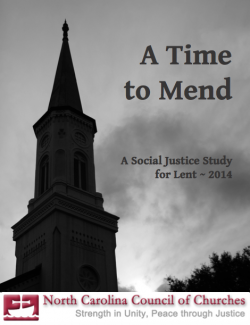 In recognition of our faithful call and of this time in history, the Council’s annual Lenten guide focuses on poverty and the ways we can respond to our sisters and brothers of low-income. We hope you and your family will find cause for reflection and inspiration for action as you share this intergenerational resource together. May we continue building as a nation toward a place where God’s love is felt by everyone through the meeting of basic human needs and the extension of true opportunities for progress.
In recognition of our faithful call and of this time in history, the Council’s annual Lenten guide focuses on poverty and the ways we can respond to our sisters and brothers of low-income. We hope you and your family will find cause for reflection and inspiration for action as you share this intergenerational resource together. May we continue building as a nation toward a place where God’s love is felt by everyone through the meeting of basic human needs and the extension of true opportunities for progress.
Click here to download “A Time to Mend: A Social Justice Study for Lent.”
Scripture: Matthew 7:9 (NRSV)
“Is there anyone among you who, if your child asks for bread, will give him a stone? Or if the child asks for a fish, will give a snake?”
Social Justice Reflection
As a parent, I cannot imagine that anyone brings children into this world joyfully anticipating that their babies will go hungry.
But in countries where starvation is brutally common, wars, climate change, and other human-made destruction can render it nearly impossible to meet the most basic need – nutrition.
So when a child or anyone else goes hungry in America, what’s our excuse? While our nation is largely exempt from life-threatening hunger, many of our neighbors experience it as life-altering.
In 2012, close to 50 million people in the US lived in food insecure households, almost a third of them children. That was just under 15 percent of American households. North Carolina was one of 10 states with a statistically significant higher rate, 17 percent. Food insecurity means limited or uncertain access to nutritionally adequate or safe food. Because of the way terms are defined and numbers calculated, unemployment is actually a stronger predictor of food insecurity than poverty.
Regardless, it comes down to being unable to afford enough food.
America is the anti-famine nation. We grow enough food. We have the means to transport it. Our government might not be collegial, but it is stable. Policies might divide us, but violent factions do not. We live in calm abundance.
And still people go hungry because they are too poor to eat.
Stories of hunger and food – literal and metaphorical – are found throughout the Bible. Manna was sent to those in the wilderness. When the disciples dithered about feeding the 5,000, Jesus called them on it, and he made enough for everyone, plus leftovers! And when it came time for him to leave us, he first broke bread with those closest to him in a sacrament many of our faith traditions continue today.
We know that food insecurity contributes to physical and mental illnesses in adults and kids. It slows children’s development and makes it harder for them to succeed in school. But Jesus was clear in his call to us to care for one another. So what are we to make of this? If we produce enough food for everyone, how do we justify our sisters and brothers and children being left with stones?
Embracing opportunities to support food pantries and food banks, to volunteer with Meals on Wheels, and to share fresh produce from community gardens are wonderful ways for individuals and families to make an immediate difference for someone in need. But we also need a sustained effort to change our nation’s food system so that people living in poverty don’t have to worry where their next meal might come from. And we need to establish and fortify a legitimate, achievable path to financial security that will eliminate their reliance on anyone else to be sure they will be fed.
We can agree that everyone doesn’t need the biggest house or the best car or the newest gadget. But shouldn’t every person have enough to eat?
Closing Prayer
God of graciousness and of plenty, help us to recognize the bounty of your creation and to generously share it with one another. Remind us that when one hungers, we all hunger, but that you have provided us with enough for all as long as we are good and faithful servants to our planet and to each other. Amen.
Links
- www.feedingamerica.org
- www.bread.org
- www.whyhunger.org
- www.nc.nokidhungry.org
- www.foodshuttle.org
Intergenerational Questions
Read the story “Stone Soup” to your children and discuss what the story teaches about sharing food.
Tell the story of Jesus feeding the crowd where Jesus says “You give them something to eat.”
Ask them if they have ever been seriously hungry or known someone at school who doesn’t have enough to eat. Ask them to think of ways they might help a hungry person.
Intergenerational Activities
- Instead of going out to eat at one of your favorite restaurants, add up the money you would have spent there, eat at home, and donate what you “saved.” By sacrificing one meal out, your family can help to feed several children.
- For young children, take “The Very Hungry Caterpillar” book to the grocery store and do a Hungry Caterpillar Hunt to Fight Hunger — selecting foods that the caterpillar ate. Then donate the food to a local food pantry, which accepts fresh produce.
- To illustrate the challenges of providing food for a family, take part in the SNAP/Food Stamp Challenge. Choose one week to live on the average amount of food stamp support in North Carolina. Spend only the average allowance, per person, on everything that you eat, including breakfast, lunch, dinner, snacks, and drinks. The average monthly benefit in North Carolina is $121.37 per person, which equates to about $4 per day.
- Have the children decorate a plain paper bag and write notes to put with contributions to a local feeding program. Don’t forget baby food and formula. Peanut butter and jelly, cereal and canned meats are also excellent choices.
- Participate in the holiday food baskets that are given through a food pantry at Easter. Your family could purchase the contents for a basket and include an Easter card from all of you.
- Participate in a local “Crop Walk” as a family.
- Take a trip to a local farm or garden and glean.
- Write a letter together to elected officials. Find the names of the people serving as your U.S. Representative and Senators by entering your zip code at www.congress.gov.
Sample Letter:
Your name and address
Date
Representative __________________
Senator __________________
U.S. House of Representatives or U.S. Senate
Washington, DC 20515 Washington, DC 20510
Dear Representative ___________ or Dear Senator ____________
I have been learning about hunger in our nation. Do you know millions of children live with hunger or are at-risk of hunger just in our country? I believe that we have to change that. Children who are hungry get sick more easily. They are not able to do good work in school. It is time for our country to do something about hunger. I write to ask you to support laws that help hungry people. Everyone should have enough to eat. If we work together, we can end hunger in our nation.
Thank you.
Sincerely,
[your name and age]

